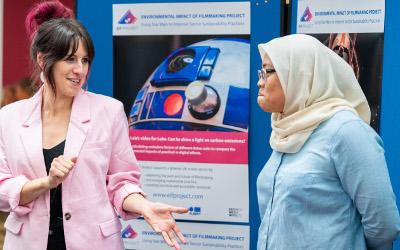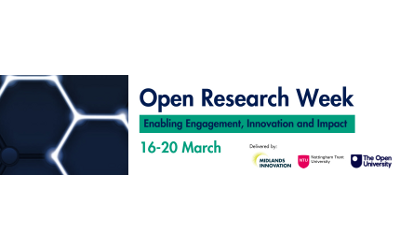The Environmental Impact of Filmmaking

Launching on Friday 7 September at the British Film Institute in London, The Environmental Impact of Filmmaking is an Open Societal Challenge project at The Open University, led by Dr Rebecca Harrison. The project, which supports the UK screen industries in adopting more sustainable practices across a range of activities, aims to:
- Lower the environmental impact of filmmaking
- Respond to skills and knowledge gaps in the screen sector and interest among filmmakers in sustainability
- Discuss global inequalities brought about by the extraction and export of raw materials, fossil fuel use, and labour practices
- Create an archive of interviews with Star Wars and other industry practitioners so people can learn more about both life on set and changing attitudes toward sustainability
In our digital age of movie and television consumption, the language we use to talk about engaging with moving images has also evolved. We ‘stream’ shows and store files on the ‘cloud’ – language clearly linked with the organic world. However, the environmental costs of Hollywood filmmaking are still very real and not all digital infrastructures are eco-friendly.
Digital screen media rely on extracting precious metals, sweatshop labour, high energy demand and e-waste that’s dumped in the Global South. So, what can this $100 billion global industry do to change?
New roles such as ‘green runners’ have emerged on film sets, alongside companies like Sustainable Film, which help productions source greener materials and recycle assets. Carbon-neutral certification for UK-based productions and toolkits to calculate carbon emissions are being used and grassroots practitioners are organising themselves to bring about positive change.
Dr Rebecca Harrison, project lead said, “Having started the research back in October 2022 we’re excited to be sharing details of our first case study and initial findings with everyone. The project aims to support environmentally sustainable working practices in the screen industries, with a focus on prop and costume making.
“We’ve been using examples from the Star Wars franchise which has been a lot of fun for us - as well as having historic significance because so many of the franchise’s UK-made props and costumes have influenced filmmakers around the world.
“Our first case study explores the carbon footprints of practical and digital versions of the droid Artoo Detoo (and people may be surprised by the results!). Alongside the research, we’ve developed a calculator tool that people can use on our website. It enables users to decide on a variety of materials – plywood, foam, silk and so on – to calculate whether it could be more eco-friendly to create their item practically or using CGI. We'll be showcasing the calculator and other project details at the launch event, which will feature the project team and our partners at leading sustainability consultancy BAFTA albert.”
Watch Dr Harrison discussing the project
Rebecca Harrisson: I'm Rebecca Harrison and I'm a Lecturer in Film and Media Studies.
So we are looking at the environmental impact of filmmaking and we're specificallylooking at props and costumes.
So we're thinking about how they're made, what techniques get used to make them, what materials people are using.
And then we trying to reverse engineer some of the ones that were made for the Star Wars franchise.
So we're taking things that people are really familiar with.
So looking at like R2-D2 and one of the costumes that was made for Kenny Baker, we're looking at Lightsabers, Padmé Amidala, big kind of red throne room dress.
So all kind of iconic designs and then trying to get people to think about them in a slightly different way, what the environmental impact would be.
So thinking about carbon emissions attached to those making processes.
Syu: My name is Syu, a Research Associate.
So my focus is on measuring the carbon emissions from the props and costumes of the film making especially for the Star Wars movies.
Rebecca Harrisson: So we're working with industry partners.
Our main one is BAFTA Albert, who are BAFTA’s big sustainability consultancy, and they do all the accreditation that you see at the end of UK film and TV productions to help get productions to be net zero.
So we're working with them on a bunch of different resources So we're hoping to create workshops for emerging filmmakers to get people thinking about this stuff right at the start of their career, and that will really embed this thinking in their practice.
We're also launching a website in the next couple of months where we're going to be hosting all of our case studies and findings.
And one of the things we're going to be offering is a very early stage calculator tool so that people can go on and they can make comparisons between different kinds of material to work out which would be the most sustainable for their asset.
One of the things that we're really keen to do with that is get people thinking about the differences between physically making something.
So whether you making out of plastic wood or metal or whether you're doing it CGI, because one of the really big myths about digital is that it's greener.
And I think it's because you're not seeing the process and people aren't really thinking about all of the material stuff that goes into making a computer.
The energy it uses, the serviers that are behind the scenes storing the information.
So yeah, that's going to be one of the things that we factor in and people will be able to compare and say, okay, well, if I make this out of metal, it might actually be more sustainable than the amount of energy that it would need to be done on a computer.
Syu: So that's some challenge, which is like every LCA analyst got.
Which is like the data collection is like the crucial part.
And then like because this one is more to historical physical props as well.
So it's hard to get the data access and we need to dig it from the archives, interview the peoplethat are involved in this filmmaking.
So then that's the most challenge that we facing at the moment.
And then also like we need to access like the data, which is like, some of them it's not documented.
So then we need to make like a lot of assumptions, which is normal for the LCA people.
But then, yeah, we need to make sure that we clarify in the future.
Rebecca Harrisson: So yeah, we're hoping to just get people sort of in a different mindset with this.
Sign up for the launch event via Eventbrite
The OU’s Open Societal Challenges Programme aims to tackle some of the most important societal challenges of our time through impact-driven research.
The Programme’s focus on the themes of Tackling Inequalities, Living Well and Sustainability aligns well with the OU’s mission to be open to people, places, methods and ideas.
The Programme’s aim is to apply excellent research by OU academics to some of the most pressing challenges facing people across the UK and worldwide to transform lives and drive societal change.
Contact our news team
For all out of hours enquiries, please telephone +44 (0)7901 515891
Contact detailsNews & articles

Open Research Week to spotlight innovation in 2026
Open Research Week will return from 16–20 March 2026, uniting Open University researchers and partners to explore how open practices drive engagement, innovation and societal benefit.